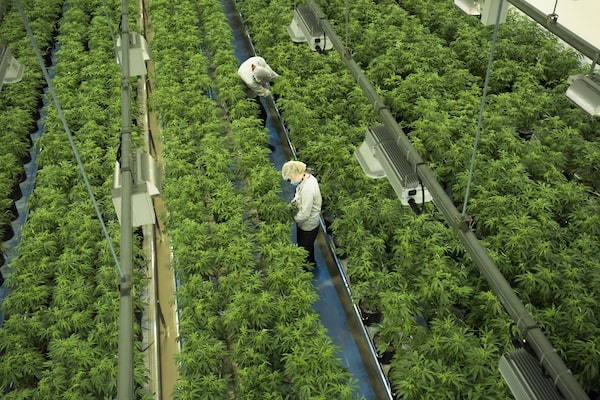
Canopy announced in April it would pay US$300-million to secure the right to buy Acreage should federal marijuana laws change in the United States, where the drug is still illegal.Sean Kilpatrick/The Canadian Press
Part of cannabis and investing
A small but vocal hedge fund has come out against Canopy Growth Corp.'s attempt to acquire a U.S. cannabis producer, complicating a situation already strained by shareholders’ confusion about the complex transaction.
San Francisco-based Marcato Capital Management LP on Monday released a public letter to Acreage Holdings Inc.'s board of directors, saying it does not support Canopy’s attempt to buy Acreage. Marcato is run by Mick McGuire, a former partner at Bill Ackman’s Pershing Square Capital Management, and he said that under the proposed deal, Acreage would be selling itself for cheap, and that the transaction is “unbelievably lopsided in Canopy’s favour."
Using a novel structure, Canopy announced in April it would pay US$300-million to secure the right to buy Acreage should federal marijuana laws change in the United States, where the drug is still illegal. Canopy agreed to pay US$3.4-billion for Acreage if the laws change, based on where its own shares were trading at the time of the announcement.
Marcato owns 2.7 per cent of Acreage’s subordinate voting shares, and the votes of one-third of this class of shareholders are needed to block the transaction. Most of Acreage’s shareholders are retail investors, who are not likely to vote in a co-ordinated way.
However, Marcato’s opposition creates another hurdle that Canopy and Acreage must clear. Acreage’s shareholders have already voiced confusion about whether the deal will actually happen, and how much money they would receive upfront. In response, chief executive officer Kevin Murphy drafted answers last week to investors’ frequently asked questions. He also wrote a public letter with the hope that a fuller explanation will help investors “see the forest through the trees.”
Marcato’s stand also marks one of the rare times Canopy has faced vocal opposition. As the legalization of recreational cannabis lured investors to the sector, Canopy blossomed into one of the world’s most respected producers, helping it earn a $23-billion market value. Some of Canada’s larger cannabis companies have faced criticism, but Canopy has mostly earned praise.
“We are very confident this deal will get done," Acreage spokesperson Howard Schacter said in an interview. "This is one shareholder’s point of view, and it’s inconsistent with the vast majority of shareholders we’ve heard from.” Despite the CEO letter last week, Mr. Schacter said investor confusion does not mean opposition. Canopy did not return a request for comment.
Acreage’s shares fell 5.6 per cent on Monday, to close at US$20.77. The sell-off comes even though Canopy offered to pay a 42-per-cent premium in the event of a takeover, and that premium has since increased because Canopy’s shares have gained 14.8 per cent since the deal was announced.
It is unclear how long Marcato has held its position in Acreage. When asked to clarify, spokesperson Nathaniel Garnick said Mr. McGuire was not available for comment on Monday. Mr. McGuire also did not comment on whether he could change his opinion if Canopy agreed to pay Acreage more money upfront, or if Canopy offered Acreage shareholders more of its stock if the takeover is triggered.
Instead, he stuck to Marcato’s public letter. “We believe enterprise values of cannabis companies will skyrocket upon the relaxation of current federal restrictions,” he wrote. “Accordingly, Marcato believes it is highly imprudent for Acreage to sell itself today at the proposed valuation, with so much unlocked growth and value embedded in the company.”
He also painted Acreage as more attractive alone than as part of Canopy. “Acreage shareholders are being asked to exchange an attractively valued security for a highly speculative one,” he wrote, adding that it is unclear when and if a full-blown takeover would occur. In the meantime, Acreage must abide by deal covenants that would not allow it to reorganize or “materially change its business or regulatory strategy" without approval from Canopy.
Marcato’s fund performance has been volatile in recent years. The company returned 21 per cent in 2017, but lost 12 per cent in 2018.